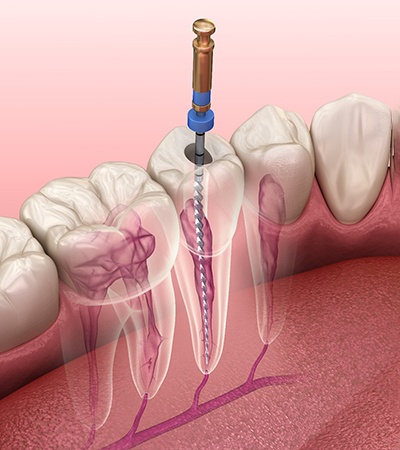Root Canal Therapy – Dayton, OH
Get Reliable Relief for Aching Teeth

Given its reputation, you might be nervous about getting root canal therapy. That’s understandable - nobody likes unpleasant treatment. In truth, though, this procedure isn’t anything to fear. On the contrary, it’ll relieve your toothache and even save your pearly white! A root canal from us is thus a terrific aid for your smile. However, our office is happy to explain if you want to learn more. Just keep reading or book a consultation at our office.
Do I Need Root Canal Therapy?

Root canal therapy treats an infected or abscessed tooth, which occurs when bacteria invade the chomper’s pulp. So, you’ll need a root canal if you show signs of a dental infection. Therefore, watch out for the following symptoms:
- Tooth Sensitivity – If a tooth hurts from hot or cold temperatures, its blood vessels and nerves may be infected.
- Persistent Tooth Pain – Occasional toothaches are normal. Still, those that persist could stem from an infection.
- Discolored Tooth – A tooth’s surface can turn dark when its pulp is infected.
- Swollen Gums – Pus can collect in the gums if your tooth is infected. From there, the pink tissue may become swollen or tender.
- Tooth Looseness – Pus from infected pulp can soften the bone supporting a tooth. As a result, said tooth may feel looser.
Contact our office at once if you notice the signs above. We’ll quickly get you an appointment.
The Root Canal Process

By nature, root canal therapy is an involved and invasive procedure. It, therefore, relies on a multi-step process to work.
For the first step, the dentist will numb your mouth with local anesthesia. Doing so ensures you won’t feel pain or discomfort from their subsequent work. At most, you’ll only sense some mild pressure during the treatment.
When the treated area is fully numbed, we will perform the actual therapy. In particular, he’ll start by using dental tools to reach your tooth’s inner chamber and remove its pulp. Then, he and his team will sanitize the chomper and refill it with gutta-percha – a synthetic material that acts as a filling. They’ll wrap up this work once the tooth is sealed and protected with a temporary crown.
You’ll receive a permanent crown a few weeks after the initial therapy. When placed, it’ll fully protect your treated tooth. You’ll then be ready to enjoy your new smile!
The Benefits of Getting a Root Canal

Contrary to stereotypes, root canal therapy has many benefits. These commonly include things like:
- A Saved Natural Tooth – A root canal saves your tooth by removing its infected pulp. In other words, it prevents tooth loss and the need for restoration or replacement.
- Reduced Pain – When infected, tooth pulp can cause severe toothaches. As such, removing it with a root canal relieves your discomfort.
- Better Protection – When placed after a root canal, a crown will protect your tooth from damage. In fact, it’ll do so for a long while if given proper care.
- Lifelike Results – A treated tooth’s crown is discrete, so it won’t highlight its prior damage.
Root Canal FAQs
How Much Pain is Normal After a Root Canal?
Many patients describe the discomfort they experience following a root canal as mild. With the help of over-the-counter pain relievers, you shouldn’t have any trouble keeping it under control. Of course, you do need to be careful to avoid anything that could lead to additional discomfort, like biting down on hard foods.
The pain should only last for a few days. Eventually, it will start to fade on its own. If it lasts for too long, please give us a call and describe your symptoms so that we can figure out the best way to handle the situation.
How Long Does a Root Canal Take?
Sometimes root canal therapy can take as long as 90 minutes, but in other cases, it can be completed in about a third of that time. The reason why some procedures are longer is that some teeth are more difficult to work with than others; the location of the tooth in question often makes a significant difference for the timeline.
While root canal therapy typically only requires one appointment, sometimes two might be required. During the first visit, you’ll receive antibacterial medicine that can help soothe the pain; the second visit is when the tooth will be cleaned out.
What Happens if You Wait Too Long for a Root Canal?
The longer a tooth infection goes untreated, the worse it gets. The pain might go away at some point, but this doesn’t mean your situation has improved; on the contrary, it’s usually a sign that the infection has grown so severe that the nerves inside the tooth have died.
The problem won’t stay contained to a single tooth. Eventually, it will start to spread to the rest of your mouth and even other parts of your body. Also, the tooth might be compromised to the point where it has to be removed. To avoid these issues, it’s highly recommended that you make arrangements to have root canal therapy performed as soon as you can.
Do Root Canals Cost More Than Tooth Extractions?
Indeed, root canal therapy usually has a higher price than a tooth extraction. On the other hand, you have to remember that the initial cost of extraction doesn’t include what you would have to pay to replace the tooth in question, and it also doesn’t account for the treatment of any oral health issues that might arise as a result of not having a full set of teeth. Root canal therapy allows you to keep the treated tooth, meaning you can avoid the additional costs that often come with tooth extraction.




